England's National Curriculum Edition

Everything you need to teach Primary Mathematics
A comprehensive programme meticulously designed for EYFS, KS1 and KS2.
Meet all the requirements of the National Curriculum of England, plus make a real difference for all the children in your school.
For Teachers
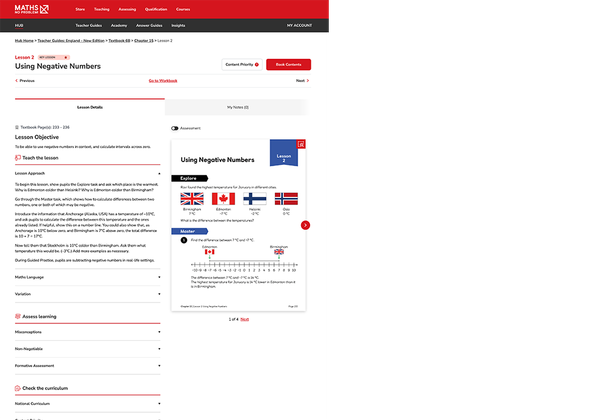
Teacher Guides:
All the information you need to effectively teach every lesson in each book
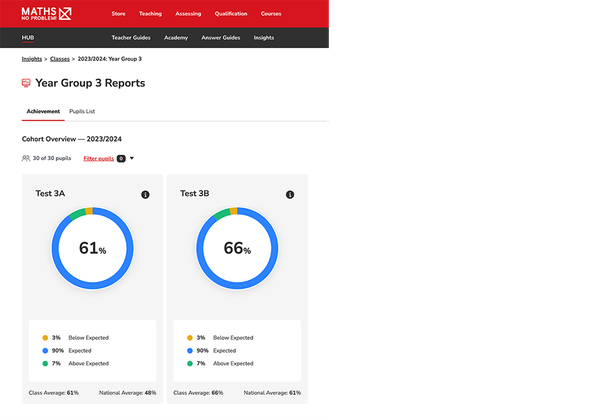
Insights:
An innovative math assessment tool that incorporates content and cognitive domain assessment

The Academy:
A comprehensive CPD resource tailored for educators featuring an extensive library of video courses
For Pupils

Textbooks:
Two textbooks for each year group from Year 1 to Year 6 containing all the lessons to cover the entire curriculum

Workbooks:
Practice workbooks that include topic reviews and assessments throughout the year
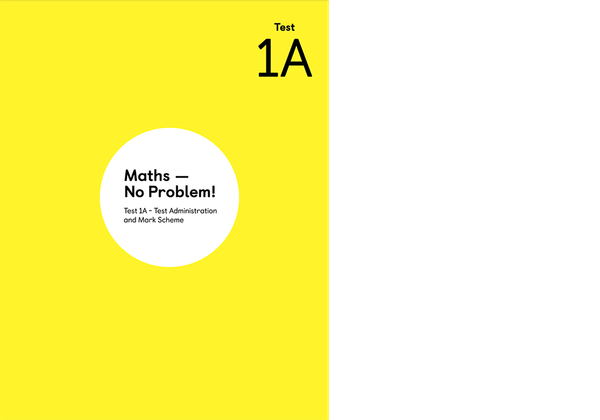
Assessment Papers:
Mid-year and end-of-year summative assessments for each year group that can be used with Insights
For Parents

Parent Hub:
A place where information, scope-and sequence, and downloadable resources are made available for parents.

Parent Videos:
Supporting videos that can be placed on any school website to help parents understand the teaching methods
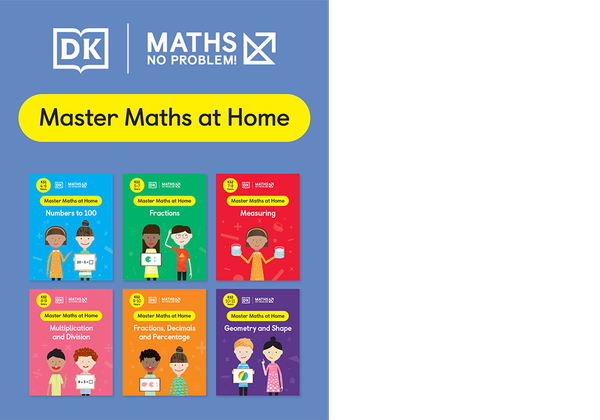
Maths at Home:
36 books spanning 6 year groups to help parents teach their children maths mastery in the home environment
By having everything you need at your fingertips, you can focus on what truly matters — inspiring and educating your students. Spend less time on searching and on fabricating lessons, and more time on impactful teaching.
Get started now:
Key Features
English National Curriculum 2014 Alignment:
Our series is specifically tailored to meet all objectives of the English National Curriculum, ensuring complete coverage and progression.
Mastery Approach:
We implement the mastery approach endorsed by the National Centre for Excellence in the Teaching of Mathematics (NCETM), which ensures the fostering of deep, long-term understanding of mathematical concepts.
Concrete Pictorial Abstract (CPA) Progression:
Following recommendations from the Department for Education, we utilise the CPA approach to build robust conceptual understanding in all learners.
Problem-Solving and Reasoning:
In accordance with curriculum goals, our series emphasises critical thinking, mathematical reasoning, and problem-solving skills.
When you can get everything you need to succeed, there’s no need to wait —
Get started now:

Alignment with National Curriculum Aims
Maths — No Problem! is meticulously designed to meet the goals of the National Curriculum in England. Our programme ensures that pupils:
Become fluent in the fundamentals of mathematics:
Through our mastery approach and CPA progression, students develop conceptual understanding and the ability to recall and apply knowledge rapidly and accurately.
Reason mathematically:
Our emphasis on problem-solving encourages students to follow lines of enquiry, conjecture relationships, and develop arguments using mathematical language.
Solve problems:
By applying their mathematics to a variety of routine and non-routine problems, students learn to break down problems into simpler steps and persevere in the face of difficulty to seek solutions.
By aligning closely with these core aims, Maths — No Problem! ensures that students in England receive a comprehensive mathematics education that prepares them for both further academic study and real-world applications.
Feel confident choosing a programme aligned with the National Curriculum for a top-tier mathematics education.
Curriculum Coverage
Maths — No Problem! covers all areas of each programme of study in the English National Curriculum for Mathematics for KS1 and KS2, including as well as the Early Years Framework including:
Early Years Foundation Stage (EYFS) Mathematics

The Department for Education (DfE) in England has set specific requirements for teaching mathematics in the early years. These requirements are outlined in the Early Years Foundation Stage (EYFS) framework. Here are the key points:
Number:
Children learn to count confidently and develop a deep understanding of numbers to 10, including the composition of each number. They subitise (recognise quantities without counting) up to 5. Children learn to automatically recall number bonds up to 5 (including subtraction facts) and some number bonds to 10.
Numerical Patterns:
Children learn to verbally count beyond 20, recognising the pattern of the counting system. They compare quantities up to 10, recognising when one quantity is greater than, less than, or the same as another quantity. Children explore and represent patterns within numbers up to 10, including evens and odds, double facts, and how quantities can be distributed equally.
Teaching Approach:
Children learn through play-based activities and daily routines that integrate mathematics. This approach encourages exploration of mathematical concepts using diverse resources, fostering a natural understanding of numbers and patterns in their environment.
The EYFS resources fully meet all the requirements set out by the Department for Education (DfE) set out in the Early Years Foundation Stage (EYFS) framework. They are designed to support these learning goals through play-based activities and guided exploration, laying a strong foundation for future mathematical learning in Key Stage 1 and beyond.
Key Stage 1 (KS1; Years 1 and 2)

Number and place value:
Students learn to count, read, write, and understand the value of digits in numbers.
Addition and subtraction:
Pupils develop strategies for adding and subtracting numbers mentally and using written methods.
Multiplication and division:
Children begin to understand multiplication and division through grouping and sharing small quantities.
Fractions:
Students are introduced to simple fractions of objects, shapes, and quantities.
Measurement:
Pupils learn to measure, compare, and solve problems involving length, mass, capacity, time, and money.
Properties of shapes:
Children identify and describe the properties of 2D and 3D shapes.
Position and direction (Geometry):
Students learn about position, direction, and movement, including whole, half, quarter, and three-quarter turns.
Statistics (Year 2 only):
Pupils begin to interpret and construct simple pictograms, tally charts, block diagrams, and tables.
Key Stage 2 (KS2; Years 3-6)

Number and place value:
Students work with larger numbers and develop a deeper understanding of place value.
Addition and subtraction:
Pupils refine their mental and written methods for addition and subtraction with increasingly large numbers.
Multiplication and division:
Children develop efficient written and mental methods for multiplication and division.
Fractions:
Students work with more complex fractions, decimals, and percentages, understanding their relationships.
Measurement:
Pupils work with a wider range of measures and solve increasingly complex problems involving measurement.
Properties of shapes (Geometry):
Children study more complex 2D and 3D shapes, including their properties and relationships.
Position and direction (Geometry):
Students work with coordinates, translations, and reflections in the first quadrant.
Statistics:
Pupils interpret and present data using more advanced charts and graphs, and solve problems using information presented in various formats.
Ratio and proportion (Year 6 only):
Students learn to solve problems involving relative sizes, scaling, and unequal sharing and grouping.
Algebra (Year 6 only):
Pupils are introduced to basic algebraic concepts, including using simple formulae and expressing missing number problems algebraically.
For each programme of study the programme covers both statutory and non-statutory requirements of the English National Curriculum for Mathematics:
All statutory requirements:
These are the compulsory elements that all schools must teach. Our series ensures complete coverage of these essential components across all year groups.
All non-statutory requirements:
While not mandatory, these elements provide valuable guidance and opportunities for deeper learning. Our series incorporates these to offer a comprehensive and enriched mathematical experience.
We’ve got it all covered — so you can jump straight into teaching exactly what they need.

Recognition from Department for Education and Expert Panel
Maths — No Problem! has received significant recognition for its alignment with the English National Curriculum and its effectiveness in teaching mathematics:
Department for Education (DfE) Approval:
Our programme was approved by the DfE for use in English schools, meeting their rigorous criteria for high-quality textbooks.
Exclusive DfE Approval in 2017 and 2018:
Maths — No Problem! Primary Series was the only mathematics mastery programme to receive full approval from the Department for Education in 2017 and 2018 for KS1 and KS2 as well as the only programme that was approved for match funding by the DfE for the entire duration of the match funding programme (run by the Department of Education), highlighting our exceptional quality and alignment with curriculum standards.
Minister of Schools Endorsement:
The Minister of Schools has acknowledged Maths — No Problem! as meeting all the criteria set forth for effective mathematics teaching resources.
Expert Panel Validation:
An independent expert panel, appointed by the DfE, has confirmed that Maths — No Problem! materials fully align with the curriculum and demonstrate best practices in mathematics education.
These endorsements underscore our commitment to providing top-tier educational resources that meet and exceed national standards.
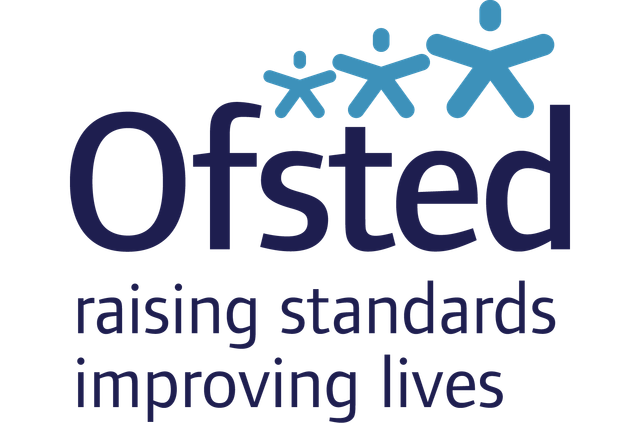
Ofsted's Perspective on Maths — No Problem!
The Office for Standards in Education, Children's Services and Skills in England (Ofsted), has recognized the effectiveness of the Maths — No Problem! approach in several school inspections:
Curriculum Sequencing:
Ofsted has positively noted our programme's well-sequenced curriculum, which aligns with their emphasis on carefully planned progression in mathematics.
Deep Understanding:
Inspectors have commended schools using Maths — No Problem! for fostering pupils' deep understanding of mathematical concepts, rather than mere procedural knowledge.
Problem-Solving Skills:
Ofsted reports have highlighted the improved problem-solving abilities of students in schools implementing our programme.
Teacher Confidence:
Schools using Maths — No Problem! have received positive feedback on increased teacher confidence in delivering mathematics lessons.
While Ofsted does not endorse specific programmes, these observations from various inspection reports underscore the alignment of Maths — No Problem! with Ofsted's criteria for high-quality mathematics education.
Gain a programme that meets and exceeds national standards.
Why Should You Choose the Maths — No Problem! Programme?
Curriculum Expertise:
Our team includes experts in the English National Curriculum, ensuring accurate and comprehensive coverage.
Ofsted Recognition:
Our approach aligns with Ofsted's emphasis on curriculum sequencing and progression.
Proven Results in English Schools:
Numerous schools across England have reported significant improvements in mathematics attainment using our programme.
Continuous Professional Development:
We offer tailored CPD to support teachers in delivering the English National Curriculum effectively.
Transform your school’s mathematics education with Maths — No Problem! Primary Mathematics Series for England, ensuring you’ve set your pupils up for success in academia and in the real-world. Choose a programme that meets and exceeds the expectations of the English National Curriculum 2014.
FAQs
When is the best time to start?
The best time to start is now, since there is no need to wait to implement the very best primary mathematics education programme. Meet with one of our representatives to start your Maths — No Problem! journey towards success.
Will England’s National Curriculum Edition of the Primary Series help our school get a better Ofsted Rating?
Ofsted reports have highlighted increased teacher confidence and problem-solving abilities in school utilising Maths — No Problem! Inspectors have commended schools using our programme for its carefully planned curriculum sequence and how it fosters deep understanding of concepts.
Is Maths — No Problem! suitable for schools following the EYFS Framework?
Yes, Maths — No Problem! England’s National Curriculum Edition of the Primary Series follows the specific requirements of EYFS, laid out in the Early Years Foundation Stage Framework. The Primary Series is intentionally designed to engage pupils with play-based activities and guided exploration while fulfilling all the requirements of EYFS. This prepares EYFS pupils for a successful transition to Key Stage 1 and beyond.
How does Maths — No Problem! support the transition from Key Stage 1 to Key Stage 2?
Maths — No Problem! supports the transition from Key Stage 1 to Key Stage 2 through its consistent approach and carefully structured curriculum. Our programme's emphasis on deep understanding and problem-solving skills provides a strong foundation in Key Stage 1 that seamlessly progresses into the more advanced concepts of Key Stage 2, ensuring continuity in learning.
How does Maths — No Problem! prepare students for secondary school mathematics?
Maths — No Problem! prepares students for secondary school mathematics by fostering deep understanding, problem-solving skills, and mathematical reasoning. The programme's consistent approach from EYFS to Year 6 builds a strong foundation, enabling students to discuss mathematical ideas confidently and apply their knowledge effectively in more advanced contexts.
How does the programme prepare pupils for Key Stage 1 & Key Stage 2 SATs?
While Maths — No Problem! Primary Series is not specifically designed as a SATs preparation tool, the comprehensive coverage of the English National Curriculum ensures that pupils are well-prepared for the mathematical content and problem-solving skills assessed in the SATs.
How is maths progress assessed in primary school?
Maths progress in primary school can be assessed through various methods. The Maths — No Problem! Primary Series offers Teacher Guides with everyday assessment prompts and formal papers. Academy provides videos for teachers on assessment strategies and tips. Additionally, Maths — No Problem! offers Insights, a comprehensive tool that gives teachers instant data to identify gaps and improve results, helping teachers focus on specific areas. Insights includes paper tests with digital diagnostics capabilities, allowing for analyzing mathematical strands and question types based on cognitive domains.
How are schools held accountable for delivering the curriculum?
Schools in England are accountable for curriculum delivery through various mechanisms. Ofsted inspections evaluate implementation and progress, while national assessments like SATs measure student performance. School Development Plans are reviewed during evaluations. These measures ensure effective curriculum delivery and student achievement in local-authority schools, academies, and free schools, all of which are expected to offer a curriculum of similar breadth and ambition.
Can Maths — No Problem! be used alongside other maths resources?
Maths — No Problem! Primary Series is designed to be used in its entirety for its maximum effectiveness. We recommend that schools utilise the entire programme. However, external materials can be used with our programme to meet the specific needs of your school and its pupils.
What is the English National Curriculum 2014?
The English National Curriculum 2014 is the statutory curriculum for primary and secondary education in England. It sets out the programmes of study and attainment targets for all subjects at all 4 key stages. Maths — No Problem! Primary Series covers the entire primary school age range in England, from EYFS to Year 6 (ages 5-11).
How does the English National Curriculum 2014 approach mathematics?
The English National Curriculum 2014 focuses on three core aims in mathematics: fluency in fundamentals, mathematical reasoning, and problem-solving. Fluency involves strong conceptual understanding and rapid recall. Reasoning includes following enquiries, conjecturing relationships, and developing arguments. Problem-solving ensures pupils can apply maths to various problems, break them down, and find solutions. This comprehensive approach prepares pupils for future academic study and real-world applications.
Is the English National Curriculum 2014 mandatory for all schools?
It is mandatory for all local-authority-maintained schools. Academies and free schools have more flexibility but are expected to offer a curriculum of similar breadth and ambition. Maths — No Problem! Primary Series is carefully designed to align with and fully cover the objectives set out in the English National Curriculum 2014 for mathematics.
How does Maths — No Problem! support teachers in implementing the programme?
Maths — No Problem! provides teachers with comprehensive resources and more. The Teacher Hub provides Teacher Guides and Academy. Teacher Guides provides in-depth details for preparing, teaching, and assessing every lesson in the programme, as well as lesson slides, printable resources, and lesson projection opportunities. Academy offers self-paced CPD video courses. Additionally, Maths — No Problem! has tailored in-service training (INSET) for schools: offering workshops, demonstration lessons, and collaborative planning sessions.
Does Maths — No Problem! offer professional development (CPD) opportunities for teachers new to maths mastery?
Yes, comprehensive training is available for teachers implementing the programme, such as initial training for those new to the approach, which qualifies teachers for the first level of the Maths — No Problem! Teacher Qualification Programme as Fellow Teachers, and ongoing professional development opportunities. We also have training courses for teachers who are already familiar with Maths — No Problem! but want to strengthen their skillset or advance to the next levels of the Teacher Qualification Programme.
How does Maths — No Problem! support parental engagement in children's maths learning?
Yes, Maths — No Problem! offers maths resources for parents of children in subscribed schools to support their children's learning at home. These include a Parent Hub where parents can gather information, scope-and-sequence, and downloadable resources. Additionally, Parent Videos are free resources available to explain teaching methods. These resources help parents understand the programme's approach, give them confidence in the school’s direction, and provide tools to reinforce learning outside the classroom.
How does the Primary Series support pupils with special educational needs (SEN)?
Our Primary Series caters to diverse learning needs with a mastery approach, emphasising deep understanding before progression. Maths — No Problem! materials include differentiation strategies to support struggling learners and challenge advanced pupils. Textbooks feature fonts for dyslexic pupils, colour schemes for colour-blind pupils, clear illustrations for visual processing difficulties, and consistent layouts for better comprehension. Our digital platform meets WCAG 2.2 Level AA for maximum inclusivity.
How does the programme support EAL (English as an Additional Language) learners?
The visual approach and emphasis on mathematical vocabulary in Maths — No Problem! supports EAL learners in accessing mathematical concepts, even as they develop their English language skills.
Can Maths — No Problem! resources be used for differentiation in mixed-ability classrooms?
Yes, Maths — No Problem! resources are designed for differentiation in mixed-ability classrooms. The programme includes built-in strategies that allow teachers to support struggling learners and challenge advanced pupils within the same lesson structure. This approach ensures all students can access mathematical concepts and progress at their own pace, fostering inclusive learning environments.
How does Maths — No Problem! use the Singapore maths teaching methods?
Maths — No Problem! incorporates Singapore maths teaching methods by emphasizing problem-solving, visual representations of mathematical concepts, and a mastery approach. The programme focuses on developing deep understanding rather than rote learning, using the Concrete-Pictorial-Abstract approach to build conceptual knowledge. It has been inspired by Singapore's successful curriculum, which has consistently topped international rankings like TIMSS and PISA.
What is maths mastery, and how does Maths — No Problem! support this approach?
Maths mastery is an approach that emphasizes deep understanding of mathematical concepts before moving on. Maths — No Problem! supports this through its Concrete-Pictorial-Abstract progression, problem-solving focus, and differentiation strategies. The programme aligns with mastery principles endorsed by the UK government, fostering comprehensive mathematical understanding for all pupils.
What are the common challenges pupils face in primary mathematics?
Common challenges in primary maths include transitioning from concrete to abstract concepts, maintaining fluency across year groups, and applying knowledge in new contexts. The Maths — No Problem! Primary Series addresses these through its Concrete-Pictorial-Abstract approach, mastery focus, and emphasis on problem-solving. It provides built-in differentiation strategies and visual aids to support diverse learners, including those with EAL.
Transform mathematics education in your school with Maths — No Problem! Primary Mathematics Series for England.
Contact us today to learn more about implementing Maths — No Problem! in your school.